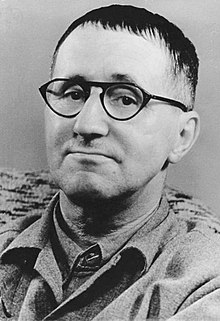
Back Bertolt Brecht AF Bertolt Brecht ALS Bertolt Brecht AN برتولت بريشت Arabic برتولت بريشت ARZ Bertolt Brecht AST Bertolt Brecht AY Bertolt Brext AZ برتولت برشت AZB Бертольт Брехт BA
Bertolt Brecht | |
|---|---|
 Brecht in 1954 | |
| Born | Eugen Berthold Friedrich Brecht 10 February 1898 Augsburg, Bavaria, German Empire |
| Died | 14 August 1956 (aged 58) East Berlin, East Germany |
| Occupation |
|
| Genre | |
| Literary movement | Non-Aristotelian drama |
| Notable works | |
| Spouses | |
| Children |
|
| Relatives | Walter Brecht (younger brother) |
| Signature | |
Eugen Berthold Friedrich Brecht[a] (10 February 1898 – 14 August 1956), known as Bertolt Brecht and Bert Brecht, was a German theatre practitioner, playwright, and poet. Coming of age during the Weimar Republic, he had his first successes as a playwright in Munich and moved to Berlin in 1924, where he wrote The Threepenny Opera with Elisabeth Hauptmann and Kurt Weill and began a life-long collaboration with the composer Hanns Eisler. Immersed in Marxist thought during this period, Brecht wrote didactic Lehrstücke and became a leading theoretician of epic theatre (which he later preferred to call "dialectical theatre") and the Verfremdungseffekt.
When the Nazis came to power in Germany in 1933, Brecht fled his home country, initially to Scandinavia. During World War II he moved to Southern California where he established himself as a screenwriter, and meanwhile was being surveilled by the FBI.[3] In 1947, he was part of the first group of Hollywood film artists to be subpoenaed by the House Un-American Activities Committee for alleged Communist Party affiliations.[4] The day after testifying, he returned to Europe, eventually settling in East Berlin where he co-founded the theatre company Berliner Ensemble with his wife and long-time collaborator, actress Helene Weigel.[5]
- ^ "Brecht". Dictionary.com Unabridged (Online). n.d.
- ^ "Brecht, Bertolt". Lexico UK English Dictionary. Oxford University Press.[dead link]
- ^ Willett 1990, pp. 312–313.
- ^ "October 30, 1947 - Famed Playwright Brecht Testifies Before HUAC – Immediately Leaves the U.S." Today in Civil Liberties History. Retrieved 13 October 2024.
- ^ The introduction of this article draws on the following sources: Banham (1998, p. 129); Bürger (1984, pp. 87–92); Jameson (1998, pp. 43–58); Kolocotroni, Goldman & Taxidou (1998, pp. 465–466); Williams (1993, pp. 277–290); Wright (1989, pp. 68–89, 113–137).
Cite error: There are <ref group=lower-alpha> tags or {{efn}} templates on this page, but the references will not show without a {{reflist|group=lower-alpha}} template or {{notelist}} template (see the help page).